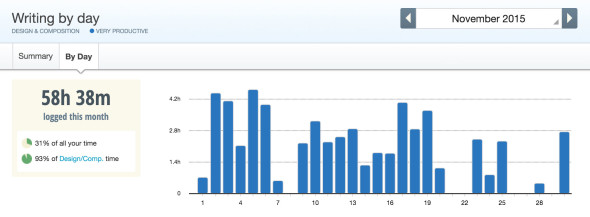Like most creative work, a big factor in the success of your writing projects is the amount of time you’re able to put into them. But simply finding the time is only half the equation. It’s also important that you use the time well. At RescueTime, we’ve spent years helping people figure out how to get the most out of their time, and along the way we’ve seen a few things trip people up over and over again. I wanted to share some of the more common pitfalls, along with a few solutions.
Pitfall #1 - The myth of productive multitasking

It’s a simple idea - If you do more than one thing at once, you should be able to get a lot more done. In fact, sometimes bouncing around between three or four projects feels really satisfying. But unless you’re one of about two percent of the population*, your brain isn't optimized for focusing on more than a single thing at a time, and it’s near impossible to do two things concurrently faster than it would take to do them separately. Even worse, research suggests that the more people multitask, the slower and more error prone they become.
It’s much better to stack tasks up and tackle them one at a time. Sometimes there are competing deadlines, so a little juggling can’t be avoided, but the more time that can be blocked off for focusing on a single activity, the better. The Pomodoro Technique is a popular way to structure time around specific activities, punctuated by short breaks to reset before diving into a new task.
Research has shown that a very small minority of people are actually able to handle multiple tasks simultaneously without problems.
Pitfall #2 - Sacrificing long term rewards for short term diversions

One of the best feelings when doing creative work is finding a state of flow - that wonderful place where everything fades away and the words just pour out. But it takes time to get there, and once you’re in the zone, it’s a fragile state that’s easily shattered. One of the main reasons that multitasking doesn’t work is that flow is disrupted and the process of refocusing has to start all over again (and again, and again).
But why is flow so difficult to maintain? The short, science-y answer is that we are evolutionarily hardwired to be on the lookout for shiny new things. The part of the brain that was super useful back when we had to worry about foraging for food and avoiding predators can hijack our attention away from steadfast thoughtfulness. Today, however, our attention is getting pulled to email, Facebook, Reddit, Slack or any of the other things that make our phones light up with a notification every couple of minutes. The fear of missing out on some important nugget of information is often too great to ignore.
Many people find success by simply removing the temptations. Completely turning off your wifi is one option, and tools like Freedom and Cold Turkey let you block distracting websites for a specified period of time. The distraction blocking tools in RescueTime can go so far as silencing your phone or signing you out of Slack in addition to blocking access to distracting websites. With the amount of information overload we generally face, having some way to turn the noise down can be hugely valuable.
Pitfall #3 - Failure to keep a sense of momentum

Especially on bigger projects, it’s easy to feel like nothing is getting done. This can be discouraging and lead to burnout. Those moments where you feel like the effort just isn’t worth it are no fun. Projects like a writing a novel are more of a marathon than a sprint, so powering through it when you feel spent is tricky.
One fix that will be familiar to anyone who’s ever attempted NaNoWriMo is to keep an updated record of your progress. Tracking your word count not only breaks up a large goal (50,000 words) into a series of small ones (1,667 words per day), it also provides a mechanism for seeing how you are chipping away at the whole project.
Tracking word count is a great tactic outside of NaNoWriMo. Websites like750words.com, or Beeminder’s integration with Draft make long-term visualizations of this progress easy. Another option is to track the time you spend writing. This can be done manually, with a tool like Toggl, or automatically with RescueTime. It’s great to be able to see the hours you’ve put in, and it gives you a benchmark to push yourself to do more.

Having a response to these three common gotchas will help set you up for success in your writing. What other pitfalls have you run into?
